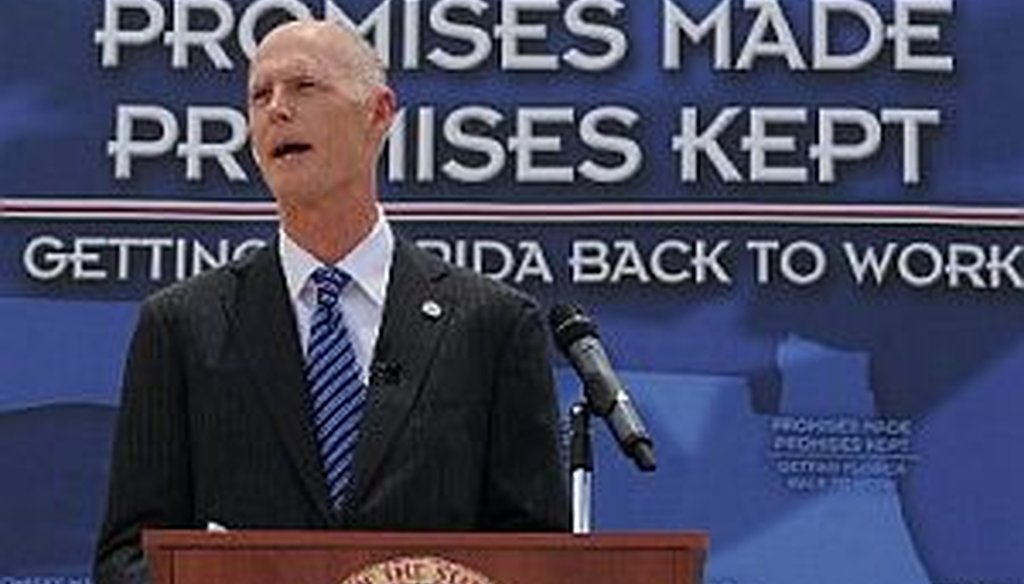Stand up for the facts!
Our only agenda is to publish the truth so you can be an informed participant in democracy.
We need your help.
I would like to contribute

PolitiFact Florida measures Gov. Rick Scott's promises on the Scott-O-Meter.
Rick Scott had never held public office when he ran for governor in 2010, but his campaign promises reflected his deeply held belief that shrinking government would unleash job growth.
As governor, Scott constantly mentions his No. 1 priority of job growth, which he says will be achieved with low taxes and business-friendly regulation. But his cheerleading hasn’t been enough to turn his promise into reality.
Nowhere is this more evident than Scott’s promise to create 700,000 new jobs in seven years.
Florida is creating more jobs, but the tally lags far behind the benchmark Scott set.
To meet his pledge of 700,000 jobs above and beyond natural economic growth, Florida needs to create just over 20,000 new jobs per month. Out of the past 23 months, the state has hit that benchmark only four times, and the unemployment rate remains 8.1 percent, above the national average. On PolitiFact Florida's Scott-O-Meter, that promise is rated Stalled.
Overall, though, Scott is keeping to his campaign promises, or at least trying. Out of 57 promises, 18 are rated Promise Kept and 14 are rated In the Works. Another seven are rated Compromise. On the negative side, 13 promises are rated Stalled while five are rated Promise Broken.
Keeping promises
Scott did keep promises that were entirely within his executive power: He didn’t take a salary and he sold the state plane.
With the help of the Republican-controlled Legislature, he ended tenure for new teachers and signed off on a formula to pay them based on how their students perform. He also required state workers to contribute 3 percent of their wages to the state pension fund, though that proposal is being challenged in court.
He also refused temporary federal funds if he thought they would create permanent spending, most notably money for a high-speed bullet train from Orlando to Tampa.
But Scott sometimes ran into the limits of his own powers.
Scott said he would freeze all regulations pending a review, but he was only able to freeze regulations that flow from the governor’s office. We rated that promise Compromise.
Courts, meanwhile, stopped Scott’s efforts to drug test welfare recipients (a promise we’ve rated In the Works). A judge ordered the testing stopped pending a constitutional review; a federal appeals court heard oral arguments in November.
Sometimes Scott didn’t meet his goal on the first try, but did on the second. For example, Scott wanted to reduce the state’s workforce by 5 percent. During his first session, the state Legislature reduced it by a smaller amount, so we rated the promise Compromise. The next year, the legislature reduced it a little more, reaching the 5 percent threshold, so we rated it Promise Kept.
Changing positions
In other areas, though, Scott appears to have softened his positions.
He started in 2011 keeping a promise to veto pork-barrel spending, putting a stop to many legislators’ pet projects. But in 2012, he allowed the creation of a new university, Florida Polytechnic, a move championed by state Sen. JD Alexander, as well as a few other projects for key legislators. PolitiFact Florida lowered the rating on the promise from Promise Kept to Compromise.
On immigration, Scott said he would enact a strict Arizona-style enforcement law to Florida and require all employers to use the E-Verify system to check workers’ legal status. He quietly abandoned both promises, and we’ve rated them Promise Broken.
Scott’s 7-7-7 plan
Scott made promises on a variety of topics, but as governor, he talks most often about jobs and economic growth. His promise to create 700,000 jobs is seven years may be the most memorable promise, but he also pledged to grow Florida’s overall economy and personal income.
Back in 2010, Scott said he would do this with substantial property tax cuts, among other moves. But the legislature rejected his plans to cut property tax rates, because Florida’s home values were dropping, and most people’s property taxes were going down anyway.
Scott also claims a key modification of his 700,000-job plan. During the campaign, he said it would be above and beyond Florida’s natural job growth, bringing his job growth target to about 1.7 million jobs. As governor, he has argued he only needs to see 700,000 new jobs to keep his promise.
Florida’s job numbers are creeping up, but slowly. If they stay at their current slow pace or go backward, Scott won’t be able to achieve his aggressive pledge of 700,000 jobs on top of natural growth. But if Florida’s economy surges and leaves the Great Recession behind, Scott may be able to come close. Whether his actual policies have an impact there remains to be seen.
PolitiFact Florida is partnering with 10 News. See video fact-checks at WTSP.com/PolitiFact.
Correction: This report was corrected to note the unemployment rate for Florida is 8.1 percent.
Our Sources
See individual promises for complete sources.















































